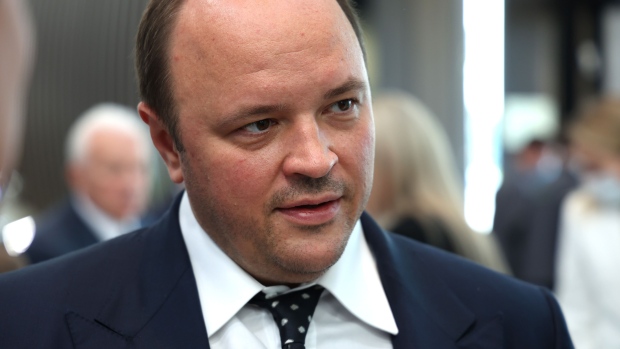Apr 28, 2024
Billionaire Andrey Guryev Clashes With Old Friend in UK Court Over PhosAgro Stake
, Bloomberg News

(Bloomberg) -- Sanctioned Russian billionaire Andrey Guryev’s fallout with a friend over a stake in one of the world’s largest fertilizer producers has been laid bare in a London dispute that rakes over alleged deals struck after the fall of the Soviet Union and promises made over a beer.
A judge has been asked to scrutinize decades-old conversations held in London’s pubs and hotels between Guryev and exiled tycoon Alexander Gorbachev who alleges he is owed billions in PhosAgro PJSC shares that he says were improperly sold to an ally of President Vladimir Putin.
Gorbachev is seeking almost a quarter of Guryev’s stake in PhosAgro as part of a bitterly contested dispute that’s run for years. A significant chunk of Guryev’s wealth comes from his just over 48% holding in the fertilizer producer controlled through two firms and his wife. The chemicals giant had an enterprise value of over $11 billion in 2023.
Guryev was first sanctioned by the UK in 2022 who see him as one of the men Putin uses to prop up Russia’s “war economy.” He is worth $10 billion, according to Bloomberg Billionaires Index.
In 2005, sitting on a kerb outside a pub after a sauna “we clinked our pints,” Gorbachev said recalling the conversation in his witness statement for the six-week long trial.
“For your 25% you don’t worry; they are under my cover until they close the criminal case on you,” the billionaire allegedly said back then, reiterating the arrangement they always had, according to Gorbachev.
“I never spoke to Gorbachev about any agreements, because there were no agreements,” Guryev said in court filings.
Gorbachev’s claim is “a fraudulent construct” with fabricated allegations and part of a series of elaborate shakedowns of Guryev, the billionaire’s lawyers said in court filings. Gorbachev cashed out his 5% options in 2007 for $20 million and now has “no legal entitlement to anything,” they said.
Guryev purchased Witanhurst, a mansion in north London’s Highgate area that’s the city’s largest private home, in 2008. He did so using the duo’s joint pool of money, Gorbachev’s lawyers said. The 65 room mansion was then priced as high as £150 million ($188 million), according to legal filings.
That is simply a delayed attempt to claim ownership rights over Witanhurst, Guryev’s lawyers said denying it was bought jointly. There was no “obshchak,” Russian slang used for a joint pool of money linked to criminal gangs, they said.
Trailblazers
Guryev and Gorbachev bonded over bartering for jeans and vodka in the Soviet-era communist party’s youth wing and together built the fertilizer giant grabbing one asset after another in the chaotic privatization era following the collapse of the Soviet Union.
“They were young former communists, blazing a trail in the unexplored wilderness of Russian capitalism,” Gorbachev’s lawyers said.
They built the business empire in risky and dangerous ways that are “a million miles from the sort of organized business planning that is discussed in MBA seminars,” they said.
The allegations by Gorbachev include informal and dubious business practices such as creating sham documents, backdating crucial papers, transferring wealth and owning assets in the UK through shady corporate structures and instructions to destroy evidence in Russia.
Guryev denies all allegations of wrongdoing. Gorbachev conspired in backdating some of the documents to “evade tax” while Guryev was neither aware nor involved, Guryev’s lawyers said.
In the decade after Soviet collapse, Gorbachev and Guryev had worked closely “under the wing of” Russia’s then richest man Mikhail Khodorkovsky, who was arrested in 2003 in the early days of Putin’s presidency. The new leader was making moves to reestablish the Kremlin as the country’s power center.
With their business empire facing pressure from the Russian government, Gorbachev agreed to “take the fall” to protect his friend. Facing criminal charges, he fled Russia in 2003. “I lost everything to protect” him, Gorbachev said. “My career, my reputation, my country and my company.”
Guryev meanwhile worked closely with Putin ally Vladimir Litvinenko to save the business empire and subsequently sold Gorbachev’s shares to him, Gorbachev alleged. Litvinenko currently holds about 21% in the Russian entity of PhosAgro.
Gorbachev waited until after the 2011 initial public offering in London that valued PhosAgro at $5.2 billion to instruct lawyers.
Gorbachev “was not interested in anything, apart from the comfort of his own life,” and his “intense grievance” was that after being a top manager he “then had to watch from afar” as the company was led to a successful IPO years after he cashed out, Guryev’s lawyers argued.
Gorbachev’s stopped working in 2003 and his extravagant lifestyle was funded by Guryev for almost a decade, the billionaire’s lawyers said. That stopped after Gorbachev commenced the “shakedown tactics” in 2012.
“In business terms, this is a swindle, and in human terms – a betrayal,” Gorbachev said.
©2024 Bloomberg L.P.






